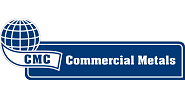Market Segment

January 12, 2021
CMC Sees Backlogs Stabilizing, Continued Margin Pressure
Written by Sandy Williams
Despite market challenges related to COVID-19, Commercial Metals Company reported earnings of $63.9 million on net sales of $1.4 billion for the first quarter of FY 2021. CMC is encouraged by stabilizing backlogs and a renewed enthusiasm by clients to move forward with projects.
“Market uncertainty continues to persist,” said Chairman, President and CEO Barbara Smith during the Q1 earnings call. “The prospect of future COVID-related lockdowns and their potential impact on the economy has led to hesitation among project owners to award new work.
“However, in recent weeks, bookings have ticked up and the backlog is starting to stabilize,” she added. “Looking beyond the near-term uncertainty, longer-term indicators remain encouraging. The amount of potential work that downstream customers are asking us to quote remains strong, indicating a robust project pipeline.”
Scrap prices rose rapidly during the quarter primarily driven by increased global demand, particularly from China, and from near-term shortages as steel mills increased production, said Smith.
“While the extent and duration of this rally is difficult to predict, it will certainly pressure margins in the near term on both our steel and downstream products.”
Price increases for CMS steel products announced in November through January should be realized by the end of the second quarter.
Said Smith, “Our customers understand as raw material prices change that there are adjustments to finished product pricing. So, right now, it’s really a question of the timing between scrap movements and price changes. And imports are relatively at bay, and that’s another factor that plays into it. So that suggests to us that we’re going to be able to recover those raw material price changes as they occur.”
CMC noted that mill costs benefited from declining prices for consumables like electrodes and alloys. Finished steel product shipments were essentially unchanged year-over-year. Growth in steel products was offset by a decline in downstream products in certain geographic areas as well as by multiple Gulf Coast storms. Rebar volume during the quarter was sustained by construction activity while merchant bar and wire rod shipments increased despite generally flat industry consumption.
CMC saw volumes in Europe jump 17 percent due to Central Europe industrial demand and service center restocking of merchant and wire rod. Rebar was stable year-over year due to construction-related demand in Poland.
Construction is continuing on CMC’s MBQ-capable micro mill and its third rolling line in Poland.
CMC is hoping that an infrastructure bill will be approved by the new administration early this year. A comprehensive infrastructure plan passed in 2021 could result in a 1.0-1.4 million ton increase in volume beginning next year, based on a normal 12-18 month lag.
“We expect finished steel shipments in the second quarter to follow typical seasonal trends in both North America and Europe,” said Smith. “As a reminder, volumes tend to decline mid- to high-single-digits from Q1 to Q2 as construction activity is slowed this time of year with the holidays and winter weather. Shipments of steel and downstream products in North America should be supported by our construction backlog.
“Manufacturing sectors of both the U.S. and Central Europe appear to signal continued recovery, which we expect to benefit volumes of merchant bar in both markets as well as our wire rod products in Europe. We anticipate margin pressure in North America during this quarter as a result of rapidly rising scrap costs and the timing lag on announced price increases.”







